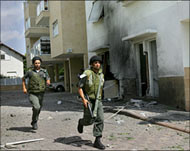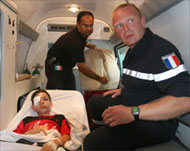Dozens killed in Israeli air raids
Israeli air raids have killed more than 40 people in Lebanon while two Hezbollah rockets have struck 80km into Israeli territory, the deepest attacks since fighting began.

In the deadliest attack on Friday, 33 people were killed and 20 injured when an Israeli strike hit a farm near Qaa, close to the Syrian border in the Bekaa Valley where workers, mostly Syrian Kurds, were loading plums and peaches onto trucks.
Television footage showed bodies of what appeared to be farm workers lined up near the ruins of a small structure in fruit groves. Strewn nearby were fruit baskets.
Mohammad Rashed, one of the wounded, said: “I was picking peaches when three bombs hit. Others were having lunch and they were torn to pieces.”
Syria’s official news agency said 17 of the dead were Syrian workers, five of them women.
A spokesman for the Israeli army said the strikes had targeted two buildings that military intelligence showed were used by Hezbollah to store weapons transported from Syria.
Rocket threat
Meanwhile, police said more than 200 rockets landed in Israel on Friday with three people killed by one barrage, raising the number of civilians killed by rocket fire to 30 since the offensive began.
Two rockets landed near the city of Hadera, 80km from the Lebanese border. No casualties were reported but the strikes are the deepest attacks into northern Israel yet.
 |
|
Two Hezbollah rockets hit Hadera, |
Hezbollah’s leader, Hassan Nasrallah, had threatened to fire longer-range missiles into Israel at the city of Tel Aviv, located 130km from Lebanon, if the Israeli army attacked deeper areas in Lebanon.
Hezbollah fighters also killed three Israeli soldiers on Friday in heavy fighting in southern Lebanon. The Israeli army has launched several incursions there in what it says is a bid to push the armed group further north and stop its rocket strikes.
An army spokesman said Israeli forces hit at least seven Hezbollah fighters during the battle in the Lebanese town of Markaba. Israeli media said the seven had been killed.
Israeli commandos in helicopters landed near the city of Tyre and clashed with Hezbollah fighters there. Lebanese government troops fired anti-aircraft guns at the helicopters, the police said.
Eight Israeli commandos were injured during the raid. A Lebanese soldier and a civilian were also killed, according to local officials.
Another Israeli soldier was killed early on Saturday morning near the Lebanese village of Taibeh. The death brought to 45 the number of Israeli soldiers killed in the conflict.
Israel also bombed bridges and other targets in the north and south of the country on Friday.
Disease fear
Israeli bombardment of a house in the border Taibeh village in south Lebanon killed seven civilians and wounded 10, a Lebanese security source said.
Warplanes also struck four bridges along Lebanon’s coastal highway that connects the capital with the north of the country, destroying the main bridge near the Casino du Liban in the Christian port of Juniyeh, as well as two others along the same road.
At least five people were killed in the strikes and more than 10 injured, the International Committee for the Red Cross said.
 |
|
Aid agencies fear disease |
The bridges were practically the only useable roads leading out of the country after Israel’s bombardment of roads to border crossing points east of the country and relief agencies warned their destruction would make the distribution of food and medical supplies much harder.
“It’s really a major setback because we used this highway to move staff and supplies into the country,” said Astrid van Genderen Stort of the United Nations refugee agency UNHCR.
“If we don’t have new material coming in, we will basically be paralysed.”
The UN Children’s Fund (Unicef) said that south Lebanon faced dire drinking water and fuel shortages which threatened the outbreak of epidemics if Israel continued bombarding the country.
“The situation is getting desperate. If shortages continue we may be witnessing outbreaks,” Paul Sherlock, a Unicef adviser, said on Friday.
Egypt meeting
|
“The situation is getting desperate. If shortages continue we may be witnessing outbreaks” Paul Sherlock, |
On the diplomatic front, the US and France inched closer to a deal on a UN resolution calling for an end to the fighting.
“There are still some issues that we have not resolved, but I think we have come a little bit closer this morning. We will keep working on it,” John Bolton, the American ambassador said.
Arab foreign ministers are planning to hold an emergency meeting in Beirut on Monday to press for a ceasefire, the Egyptian foreign ministry said on Friday.
Arab nations have repeatedly called for a ceasefire since hostilities began last month. However, Israel and the US have so far resisted, saying they want a more long-term agreement for the future of Lebanon.